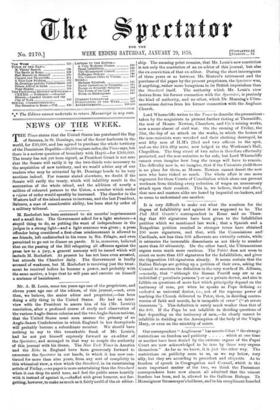Mr. A. H. Louis, some ten years ago one of
the proprietors, and eleven years ago one of the editors, of this journal,—not, even then, we believe, the senior editor and proprietor,—has been doing a silly thing in the United States. He had an inter- view with the President to assure him of his (Mr. Louis's) conviction, after a profound coarse of study and observation of the various Anglo-Saxon colonies and the two Anglo-Saxon nations, that the United States must soon assume the primacy of an Anglo-Saxon Confederation in which England in her decrepitude will probably become a subordinate member. We should have nothing to say to this remarkable freak of Mr. Louis's, had he not put himself expressly forward as ex-editor of the Spectator, and managed in that way to couple the authority of this journal with his dream. The New York Times in America and the Echo in England have been generously forward to exonerate the Spectator in our hands, in which it has now con- tinued for more than nine years, from any sort of complicity in this whimsical view, a view which the Standard, in its entertaining article of Friday,—no paper is more entertaining than the Standard when it can drop its acrid tone, and feel the public sense heartily
restrictions on freedom and publicity which at-one time or another have been denied by the extreme organs of the Papal Court are now acknowledged to be true by those very organs themselves." As far as we know, it is just the other way. The restrictions on publicity seem to us, as we say below, very silly, but they are according to precedent and etiquette. As to freedom of speech in Congregation and Council, which is the more important matter of the two, we think the Protestant correspondents have now almost all admitted that the utmost with it instead of against it,—chaffed with great humour, not for- freedom has been, and is, allowed to the Gallican Bishops. To getting, however, to make as much as it fairly could of the ex editor- I Monseigneur Strossmayer's boldness, and to his compliment founded
ship. The amusing point remains, that Mr. Louis's new conviction is not only the conviction of an ex-editor of this journal, but also the ex-conviction of that ex-editor. During the short interregnum of three years or so between Mr. Rintoul's retirement and the purchase of the paper by the present proprietors, the Spectator was, if anything, rather more bumptious in its British imperialism than the Standard itself. The authority which Mr. Louis's view derives from his former connection with the Spectator, is precisely the kind of authority, and no other, which Dr. Manning's Ultra- montanistn derives from his former connection with the Anglican Church.


































